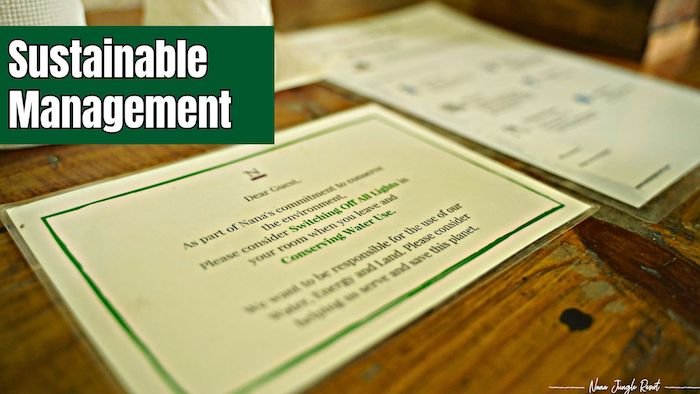Sustainable Management Practices at Nana Jungle Resort are at the heart of our operations, ensuring that every initiative aligns with our commitment to making a positive impact in the communities and environments where we work. This blog details the various responsible and eco-friendly measures implemented throughout the resort.
Sustainable Management at nana jungle resort
At Nana Jungle Resort, sustainability is a top priority. We recognize the importance of operating in a responsible and environmentally conscious manner. As a result, we have implemented numerous sustainability practices focusing on environmental, social, cultural, and economic issues. These practices aim to minimise our environmental impact, promote the well-being of our employees and the local community, preserve the local culture, and contribute to the local economy.
1. Environmental Sustainability
Our environmental sustainability practices include the use of renewable energy, waste reduction, waste management, and sustainable procurement. We have installed solar panels for water heating and implemented energy-efficient lighting systems. Moreover, the resort has planted over 10,000 native plants and trees and maintain 75% of the resort as green space. We have returned three hectares of the resort area to native grassland and river habitats to protect the movement of animals in the buer zone. We have also implemented waste reduction strategies such as composting, recycling, and the use of biodegradable products.
Environmental Commitments:
- We implement a recycling program for guests and staff
- We use energy-efficient lighting
- We use solar or other renewable energy sources
- We send food waste to organic farmers
- We compost organic waste for use in our farm and garden
- We use locally sourced organic produce to support local farmers and reduce carbon footprint and water usage
- We encourage guests to reduce waste by providing refillable water bottles and toiletry dispensers
- We have developed and maintained green spaces, including gardens and grasslands. Around 60% of the resort area is returned to the native grassland and habitat
- We have planted over 10,000 native plants and trees
2. Social Sustainability
Regarding social sustainability, we have established policies that promote human rights, health, and safety. We ensure fair wages, provide a safe and healthy working environment, and promote diversity and inclusion in our workforce. We also offer training and development opportunities to our employees to enhance their skills and knowledge.
Social Commitments:
- We hire local staff and pay them a fair wage
- We provide training and development opportunities for staff
- Develop partnerships with local organizations and communities
- Support local initiatives and charities
- Offer cultural and educational programs to guests
- Ensure no discrimination in hiring and promote diversity and inclusivity
- Provide safe and inclusive spaces for all guests, including LGBTQ+ guests
- Promote responsible and respectful tourism practices among guests
- Provide opportunities for guests to participate in community service and conservation projects
3. Cultural Sustainability
Cultural sustainability is also a key focus at Nana Jungle Resort. We respect the local culture and heritage and seek to preserve it through our tourism activities. To accomplish this, we offer cultural experiences for our guests, such as traditional dance performances, local food experiences, and visits to nearby cultural sites. We also source our products and services from local suppliers to contribute to the local economy.
Cultural Commitments:
- Respect and protect the cultural heritage and traditions of the local community
- Hire local artisans and craftsmen to create decor and furnishing
- Display and promote local art, music and literature
- Offer cooking classes and cultural experiences and highlight the local cuisines and customs
- Develop partnerships with local indigenous communities to promote cultural exchange and support their livelihoods
4. Economic Sustainability
We are committed to economic sustainability by implementing sustainable business practices that promote long-term growth and profitability. In order to do this we monitor our financial performance regularly, invest in the professional development of our employees, and maintain strong relationships with our stakeholders.
Economical Commitments:
- Develop partnerships with local businesses and suppliers
- Develop and promote sustainable tourism packages and experiences
- Invest in and support sustainable tourism infrastructure, such as bike paths and cultural shows
- Develop programs that promote local economic growth and job creation, such as community-based tourism initiative
5. Additional Sustainable Management Practices
At Nana Jungle Resort, we are dedicated to implementing sustainable practices that align with the values of Intrepid and other organizations that prioritize sustainability. By operating responsibly and sustainably, we can contribute to the well-being of our employees, guests, and the environment while supporting the local community and economy. Therefore, we also aim to protect the health and safety of our guests as well as our staff. Keeping individuals safe throughout their stay with us is of the upmost importance. In terms of health and safety we focus on:
Health and Safety Commitments:
- Provide clean drinking water and sanitation facilities for guests and staff
- Train staff on health and safety protocols to prevent accidents and injuries
- Regularly inspect and maintain equipment to ensure they are in good working condition
Finally, we prioritize the quality of our resort and everything that it has to offer. This includes the food, infrastructure, management and staff performance, and our sustainable management practices. These commitments include the following:
Quality Commitments:
- Offer healthy and nutritious food options that cater to guest’s dietary requirements
- Regularly inspect and maintain buildings and facilities to ensure they are safe and up-to-date
- Conduct regular staff performance evaluations to identify areas for improvement
- Ensure quality standards in all aspects of the resort operation
- Regularly evaluate and improve sustainability practices to ensure continuous improvement
